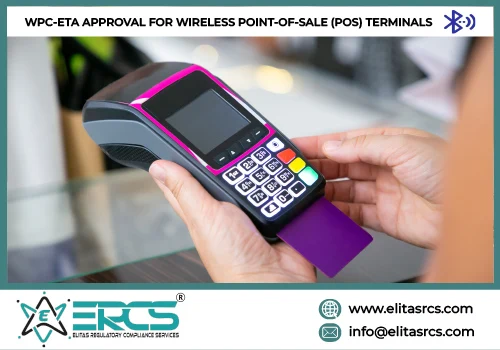WPC Approval (ETA) for
WIRELESS POINT-OF-SALE (POS) TERMINALS in India

WIRELESS POINT-OF-SALE (POS) TERMINALS
Wireless Point-Of-Sale (Pos) Terminals has fundamentally altered the way in which companies conduct their operations. These terminals make it possible for companies to collect payments in a safe and expedient manner while obviating the need for physical connections. Yet, in order to implement wireless POS terminals, one must comply with a variety of worldwide regulatory standards. One of them is India's Wireless Planning and Coordination (WPC) clearance. Wireless point-of-sale terminals that have been approved by the WPC give businesses the peace of mind that comes with knowing the devices they use are secure, dependable, and of a high quality. These terminals also offer increased mobility and flexibility, shortened transaction times, and enhanced safety. In order to connect to payment networks and complete transactions, these devices make use of wireless communication technologies including Bluetooth, Wi-Fi, and cellular networks, among others. Wireless point-of-sale terminals provide companies with a method of accepting payments that is not only flexible, secure, and efficient but also complies with applicable regulations.
The Wireless Personal Communications (WPC) Council is a regulatory entity that monitors the usage of wireless devices in India and guarantees that all wireless devices comply with certain technological criteria. In order for a manufacturer to get WPC certification for a wireless POS terminal, the company must meet with a variety of technical parameters. These specifications include radio frequency emissions (RF), electromagnetic compatibility emissions (EMC), and safety standards.
Point of Sale (POS) terminals are electronic devices that allow companies to collect payments in a secure and speedy manner without the need for physical connections. Wireless POS terminals are an example of this kind of technology. The rising need for mobile payment solutions is anticipated to continue to drive the use of wireless POS terminals, which in turn makes it vital for manufacturers and enterprises to maintain compliance with WPC regulations.
Because of its adaptability and portability, wireless point-of-sale terminals are gaining a growing following among commercial establishments. They eliminate the requirement for companies to have stationary POS terminals by allowing them to conduct transactions from any location that is within range of their wireless network. In addition to this, they include heightened security features such as encryption and tokenization, both of which guard against unwanted access to critical payment information. There is a wide variety of wireless point-of-sale terminals available, including mobile card readers that can be attached to smartphones or tablets as well as freestanding terminals that handle a variety of different payment methods. Wireless point-of-sale terminals also offer value-added services for companies, such as customer loyalty programmes, discounts, and promotions, all of which serve to promote consumer engagement and loyalty. In order for manufacturers to maintain compliance with regulatory requirements, they are required to fulfil a number of particular technical standards. These standards include those for radio frequency (RF) emissions, electromagnetic compatibility (EMC), and safety.
Basic Requirement to get WPC (ETA) approval
Following requirement should be fulfilled by applicant –
Foreign Manufacturers –
Foreign Manufacturer (Applicant) has to appoint Authorized Indian Representative (AIR).
If Foreign Manufacture (applicant) has the Branch office/Liaison office in India then, they can become an AIR.
Domestic Manufacturer –
The domestic (Indian) Manufacturer can directly apply for ETA and import license without nomination of AIR.
Required Documents
For ETA Certificate –
- Copy of Company Registration /GST registration (For address Verification)
- ID and address proof of authorized person
- Radio Frequency (RF) Test report from any foreign laboratory that is ISO 17025 certified or an Indian laboratory that is NABL approved
- Authorization letter (If authorized person is other than CEO)
- Product technical details
For Import License –
- ETA Certificate
- Purchase order
- IEC Certificate
- Proforma Invoice
What is RF (Radio frequency) test report and how to get it?
RF (Radio Frequency) testing is a method of checking the frequency of radio transmissions to ensure that they are efficiently using the spectrum. In order to achieve maximum efficiency, it is essential to ensure that radio waves in the airspace do not conflict with one another.
Manufacturers/ Importer need to get the RF test report from the ILAC/NABL accredited lab for ETA approval to sell the product in India. If the multiple RF modules contains in the particular product, then the test report of all modules to uploaded to get ETA approval.
Process to get Equipment type approval (ETA) from WPC department:
- Checking EN standard and RF testing from AuthorizedLaboratory
- Documents Preparation
- Application Filing to WPC (Online portal generation)
- Submitting the requisite fee online to Govt.
- Application Scrutinization by WPC
- Grant of ETA Certificate by WPC